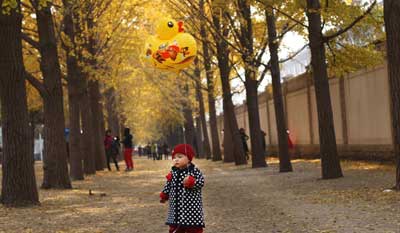One-child policy left out of key policy statement

 0 Comment(s)
0 Comment(s) Print
Print E-mail CNTV, November 14, 2013
E-mail CNTV, November 14, 2013
There was widespread speculation ahead of the Third Plenary session that the Party would call for an easing of the one-child policy. However, the final communique issued on Tuesday did not mention any plans to reform the policy. Our reporter Xia Ruixue went to Henan, China's most populous province to get reaction from the people.
 |
|
One-child policy left out of key policy statement |
30-year-old Zhao Lei was thrilled when his wife gave birth to a baby girl last year. And thanks to a change in China's family planning policy in late 2011, which allowed couples who were both single children to have more than one baby, Zhao and his wife are planning to try for a second child.
"We want to have one more child to join our baby girl. Then she won't feel lonely any more. And she'll have to shoulder less of the burden to take care of us when we are old." Zhengzhou resident Zhao Lei said.
The increasing cost of supporting a family in China has caused even couples who are eligible for a second child to choose not to. Still, there are growing calls for the one-child policy to be relaxed further nationwide, especially for couples where EITHER the husband or the wife has no siblings.
"I think if I were permitted to have one more child, I would definitely do so. Only-children get all their families' love to themselves and can become very selfish if they have no siblings." Zhengzhou resident said.
"If the policy permits, I hope I can have one more grandson or granddaughter. I know it's hard to raise two in China, but if they make it, they'll reap the benefits when they grow old." Zhengzhou resident said.
On Monday, a government spokesperson said reforms to the 30-year-old family planning policy would be taken in a prudent and well-coordinated way that responded to current and future needs.
Many were therefore surprised that the one-child policy wasn't mentioned at all in the final statement from China's Third Plenary Session, which set out the government's reform guidelines for the next decade.
"China is the most populous nation in the world. The family planning policy is one of the basic national policies, and it has been provem correct over the past 30 years. But with economic and social development, the one-child policy should change accordingly. I think one family can have two children, but no more. It's a good way to solve our aging problems as well." Liu Daoxing, vice president Henan Provincial Academy of Social Sciences, said.
China is now facing a looming aging crisis. Its working-aged population is in sharp decline, while the number of dependents is sky-rocketing. But for now, those hoping for changes to the one-child policy remain expectant.






Go to Forum >>0 Comment(s)